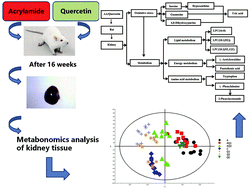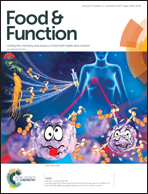Metabonomics analysis of quercetin against the nephrotoxicity of acrylamide in rats†
Abstract
This research aimed at analysing the protective effect of quercetin against the nephrotoxicity of acrylamide (AA) using metabonomics technology. Rats were randomly divided into six groups, including the control group, AA-treated group (5 mg per kg bw per d), two dosages of quercetin-treated groups (10 and 50 mg per kg bw per d) and two dosages of quercetin plus AA-treated groups. Quercetin and AA were administered to rats daily via gavage and drinking water, respectively. After a 16 week treatment, the kidneys were collected for metabonomics analysis. A total of 14 metabolites were identified in positive and negative modes via the metabonomics profiles of kidney tissues. Compared with the control group, the intensities of uric acid, 6,8-dihydroxypurine, hypoxanthine, guanosine, L-phenylalanine, succinyladenosine, tryptophan, lysophosphatidylcholines (LPC(16 : 0), LPC(18 : 1(9z)), LPC(18 : 2(9z,12z))) and inosine in the AA-treated group were significantly increased (p < 0.01); and the intensities of L-acetylcarnitine, 2-phenylacetamide and pantothenic acid in the AA-treated group were decreased (p < 0.01). However, the intensities of the previously mentioned metabolites had opposite trends in the high-dose quercetin (50 mg per kg bw per d) plus AA-treated groups (p < 0.01 or p < 0.05). The results showed that quercetin exerted protective effects on AA-induced nephrotoxicity by enhancing the antioxidant defence system of the body and regulating phospholipid, energy and amino acid metabolism.



 Please wait while we load your content...
Please wait while we load your content...